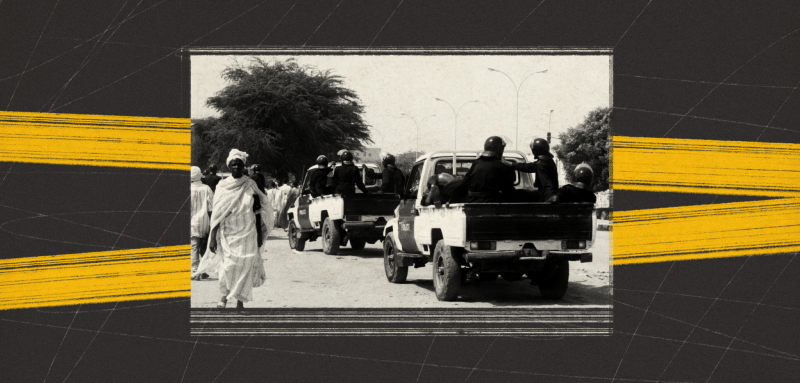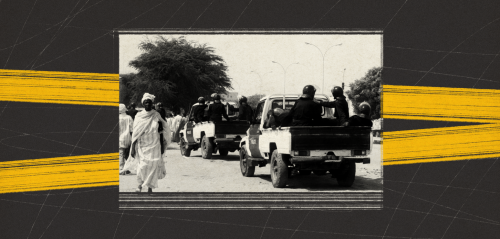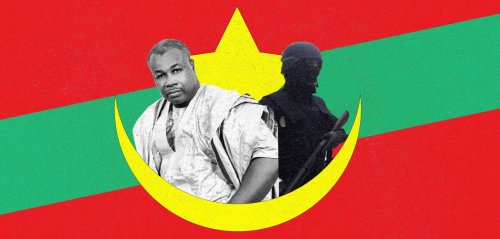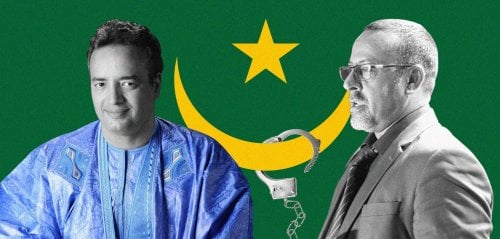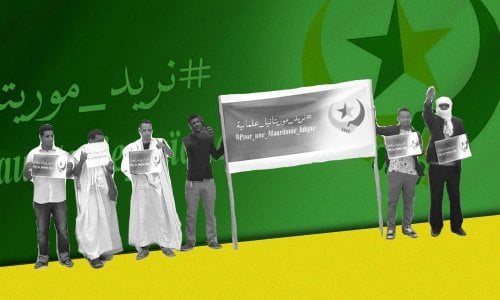On the evening of Saturday, March 11, 2023, the Mauritanian Ministries of Defense and Interior announced the killing of three extremist prisoners who had escaped from the civilian prison in the capital Nouakchott, and the arrest of the fourth fugitive. The group was killed during clashes with Mauritanian forces in a remote area in northern Mauritania, and a statement on the operation was released, saying: "During the combing and search operations carried out by ground units and Gendarmerie units specialized in combating terrorism, the latter came under heavy fire, which led to a clash with terrorist elements, and the violent clash resulted in the killing of three terrorists, the arrest of the fourth, and the martyrdom of a Gendarmerie officer of the heroic armed forces."
According to the statement, "After the committee received information that it analyzed and arrived at the hypothesis that the terrorists may be present in an area in the region of Adrar, the information was verified and then joint coordination began between the air and ground forces, which led to being able to locate the terrorists after they fortified themselves in a rough mountainous area."
The beginning of the operation that led to the killing of the three escapees took place when the wheels of a four-wheel drive vehicle they were traveling in broke down in the town of Amjamag. They then flagged down a local car whose owner grew suspicious of them and reported them to the authorities, according to local media.
But how did the operation take place? Does it mean the return of terrorism to the country? What are the effects of cutting off the internet on a population that has entered a cycle of never ending anxiety because their communication was cut off from the rest of the world? What losses has it caused to business owners whose business depends on the internet?
A week of anxiety
The escape of the extremist prisoners from the civilian prison caused a state of panic in the capital Nouakchott, and in Mauritania in general, due to how dangerous the escaped prisoners were and their escape operation that resulted in the death of two members of the guards. Among the escapees was Salek Ould Cheikh, who was sentenced to death in 2011 on charges of high treason by carrying weapons and participating in the "Riyadh bombing".
Salek was accompanied in his escape by Mohamed al-Rasoul, convicted of "taking up arms against Mauritania and carrying out attacks with the intent to kill" and sentenced to death, Mohamed Mahmoud Mohamed Yaslam, convicted of attempting to join a gathering with the aim of committing terrorist crimes and sentenced to ten years in prison (in prison since 2020), along with Abu Bakr al-Siddiq Abdelkarim, who was convicted of attempting to establish a gathering with the aim of committing terrorist crimes and receiving training abroad and sentenced to seven years in prison (in prison since 2021).
This was considered by some observers to be a major and worrying security breach of the security of Mauritania, which is surrounded by hotbeds of tension and terrorism.
The escape of the extremist prisoners from the civilian prison caused a state of panic in the capital and in Mauritania in general, due to how dangerous the escaped prisoners were and their escape operation that resulted in the death of two guards
Speaking to Raseef22, Bab Adou, assistant researcher at the Sahel Research Group at the University of Florida, tells Raseef22, "Although the prison escape brought back the memories and atmosphere of the terrorist operations that took place between 2005 and 2012, it seems to me that this latest operation does not signify the return of jihadist activity to the Mauritanian arena, as the escape operation is most likely an isolated incident, and even if there were parties from abroad who helped the prisoners escape, their goal seems to have been to get out of the Mauritanian territory and join the Mali-based extremist group and not necessarily to carry out terrorist acts inside the country."
"This is not the first prison escape by Salafist prisoners, as one of the escapees, Salek Ould Cheikh, escaped from the civil prison at the end of 2015 and was not caught until three weeks later on the Guinean border. Nevertheless, the operation indicates the existence of major security gaps. three members of the guard and Gendarmerie were killed and others were injured, which means that the escape and tracking operation led to heavy losses on the Mauritanian side," points out Adou.
Mauritania and its volatile surroundings
Mauritania lives in a volatile environment, especially its neighbor Mali, which is plagued by terrorism, and this makes some observers believe that Mauritania also faces great dangers. A few weeks ago, Mauritanian President Mohamed Ould Ghazouani said that terrorist groups understood that they should be careful not to come to us, and some linked this statement to the escape of the group of prisoners. Bab Adou says, "I don't think there is a correlation between the Mauritanian president's statement and the timing of the escape," stressing that, "Mauritania is part of the Sahel region, which has not known stability since the events of Mali in 2012, and is also part of the group of five Sahel countries created specifically to face these security challenges."
Although security authorities managed to ambush and neutralize terrorists fleeing a Mauritanian prison, the internet shutdown and the subsequent damage of thousands of businesses dependent on it, sparked anger in Mauritania
The spokesman pointed out that Mauritania is affected politically and security-wise by the security situation in the region, and faces two main challenges, "The first is securing the vast borders, especially with the state of Mali, against the attacks of armed groups operating there, and the second is preventing the infiltration of jihadist elements into Mauritanian territory, with the aim of committing kidnappings or killings, and Mauritania has succeeded over the past years in addressing these two challenges. I do not think this success is due to a secret agreement between Mauritania and the armed groups, as some local analysts say, but rather is the result of a combination of several factors, some of which are related to the circumstances of other countries that these organizations have turned to."
He stresses that "the most important challenge facing Mauritania is addressing the social grievances that have come to fuel armed groups, especially in the Sahel region, and Mauritania has not yet succeeded in addressing these social issues, which pose a real threat to civil peace and a possible cause for the spread of terrorist discourse."
Internet shutdown and its concerning repercussions
After the escape of the extremist prisoners, the authorities in Mauritania cut off the mobile internet from March 6, 2023, while the internet continued to work on fixed lines. This move was considered a restriction on citizens in their lives and freedom, and an easy way for the authorities to cut off the internet without justification. Cutting off the internet fuels rumors and deprives people of accurate information, and prevents people from checking up on each other inside and outside Mauritania after the incident. The cutoff also causes direct material losses to citizens, as many taxi applications and money transfer applications have stopped working.
Speaking to Raseef22, Mauritanian activist Nasser Weddady says, "As for the move to cut off the internet, it is a security approach, but unfortunately it is not successful, because there are tools to deal with applications that terrorists use to communicate, and this is the famous argument, and of course the real problem is that there is a real lack of performance, in terms of the policy of communication with citizens, as well as in the process of raising awareness and managing such emergencies. That's the real problem, and cutting off the internet is the easiest solution."
The activist adds, "The unfortunate thing about the cutting off the internet is that it caused a great deal of damage. For example, Mauritanians rely heavily on the internet, especially small company and business owners, while SNIM company, the largest exporter of steel, will not be affected. Only small business owners, such as owners of car rental agencies, or owners of restaurants that rely on a delivery service, freelancers, and medium and small private sector companies, will be affected, because the internet is their lifeline that connects them to the rest of the world. Of course, they say that Wi-Fi is available, but it is a service that takes us back to the 1990s and limits the movement of business owners. For example, some business owners depend on their ability to move and communicate at the same time, and this is dangerous, and of course this will negatively affect a number of citizens."
The unfortunate thing about the cutting off the internet is that it caused a great deal of damage. For example, Mauritanians rely heavily on the internet
According to Nasser Weddady, "There are broad segments of the population that do not have fixed internet at home, and this disconnects and cuts off citizens in the vast country, and the most affected segments are those with the lowest income."
Weddady stressed that "it must be acknowledged that the internet has become part of daily life like water and electricity, and according to some estimates, the five days of internet outage costs $10 million, or about three billion Mauritanian ouguiya, which is a huge amount by local standards, not to mention the impact of cutting off mobile phone services on the movement of foreign investors and other matters, and this outage harms the country's reputation as a place that is not conducive to investment, and lacks stability in infrastructure. This is very harmful to the reputation of a country that needs foreign investments, and needs to attract international partners, and all of this is not helpful for improving the country's image as a place where foreign partners can invest."
It is clear that the aim of the internet shutdown is to force the fugitives to communicate using regular phones, which are subject to security surveillance.
"From a purely human rights point of view, this is almost certainly detrimental to the state's human rights classifications," the activist concludes.
Mauritanian government spokesman and Minister of Equipment and Transport Nani Ould Achrouga commented on the internet shutdown after the cabinet meeting on Thursday March 9th, saying that "security takes precedence over everything, and what was cut was only the mobile network for security reasons".
For its part, Access Now called on the Mauritanian authorities to completely restore the internet and immediately reconnect the country to it. The organization confirmed in a statement that "the Mauritanian authorities have a long history of cutting off the internet during critical national moments, as it cut off the internet in 2019, following highly competitive presidential elections."
Researcher Bab Adou says, "I don't know exactly how cutting off the phone internet helped track down the escaped prisoners. What is clear is that the aim of shutting off the internet was to force the fugitives to communicate with regular phones that are under security surveillance, unlike encrypted applications. But even if cutting off the internet was crucial in the process of tracking down the escapees, the cost was too high on people's daily lives, which have become increasingly dependent on the internet, as is the case in the rest of the world. With the absence of accurate statistics to determine the losses, it can be said that cutting off the internet has clearly affected small and medium-sized companies, especially those that rely on phone applications to communicate with customers, in addition to telecommunications companies, of course. In addition, cutting off the internet will also affect the country's reputation and human rights record."
He concluded by saying that "there is no justification for this move, especially since it is being carried out without reference to any legal framework and without providing any justifications or explanations to public opinion."
Raseef22 is a not for profit entity. Our focus is on quality journalism. Every contribution to the NasRaseef membership goes directly towards journalism production. We stand independent, not accepting corporate sponsorships, sponsored content or political funding.
Support our mission to keep Raseef22 available to all readers by clicking here!
Interested in writing with us? Check our pitch process here!
